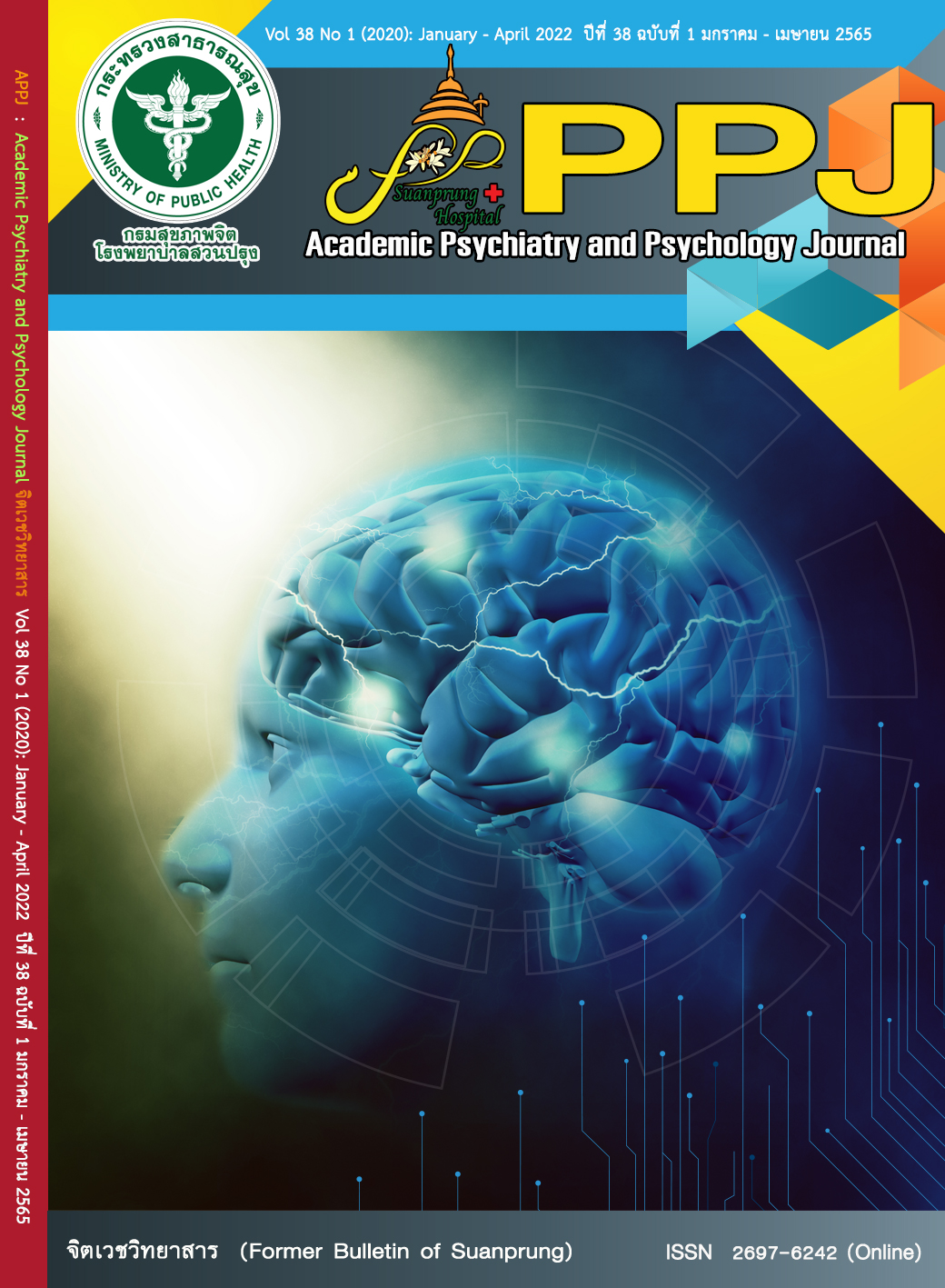Association Between Internet Addiction and Depression of High School Students in Covid-19 Situation, Sanpatong District, Chiangmai, Thailand
Main Article Content
Abstract
Objective: To study the prevalence of internet addiction behavior and the relationship between the severity of internet addiction behavior and the severity of depression and self-esteem among high school students (grades 1-6) in Covid-19 situation, Sanpatong district, Chiangmai, Thailand.
Materials and methods: This study was a cross-sectional survey research. Data were collected by using a questionnaire from 1 – 31 August 2021 using Google Sheet program. The tools used included general information inquiry form of high school students and inquiry form of Internet use questionnaire, Thai version internet addiction test, Thai version of The Patient Health Questionnaire for Adolescents (PHQ-A) and revised versions of the Rosenberg Self-Esteem Scale, Thai version. Data was analyzed by using STATA program.
Results: There were 1,282 participants, more female than male (2:1); 62.5% of high school students (819 people) use the internet more than 8 hours a day. Prevalence of internet addiction was 16.7% (215 people). Associated factors with internet addiction were sex, frequency of Internet use, average time spent using the internet and severity of depression. Factors such as grade level, family status, past semester academic results, career goals, further education goals, the advantages and disadvantages using the internet, suicidal idea or suicidal attempt, and low self-esteem were not associated with internet addiction.
Conclusion: The findings indicate that the prevalence of internet addiction is 16.7% and there is an association between the severity of internet addiction and the severity of depression of high school students in Covid-19 situation.
Article Details

This work is licensed under a Creative Commons Attribution-NonCommercial-NoDerivatives 4.0 International License.
บทความหลังผ่านการปรับแก้จากกองบรรณาธิการแล้ว เป็นลิขสิทธ์ของวารสารจิตเวชวิทยาสาร โรงพยาบาลสวนปรุง กรมสุขภาพจิต กระทรวงสาธารณสุข ห้ามเผยแพร่เพื่อประโยชน์ทางการค้าโดยไม่ได้รับอนุญาต แต่อนุญาตให้เผยแพร่บทความดังกล่าวเพื่อประโยชน์ทางการศึกษาแก่ประชาชนทั่วไป ทั้งนี้กองบรรณาธิการไม่จำเป็นต้องเห็นด้วยกับบทความหรือข้อคิดเห็นใดๆ ที่ปรากฏในวารสารสวนปรุง
References
Strategy and Planning Division Department of Mental Health, National Mental Health Development Plan, Issue 1 (2018 - 2037) : Mental Health Knowledge Library. Department of Mental Health [Internet]. 2019 [cited 2021 Jun 29]. Available from: https://www.dmh-elibrary.org/items/show/450
Rajanukul Institute. Department of mental health suggests smart play, discipline, prevention, addiction, school holidays [Internet]. 2017 [cited 2021 Jun 29]. Available from: https://th.rajanukul.go.th/preview-3180.html
Chintaradeja P. Factors affecting internet addiction behavior by different generations in Bangkok: final report [Internet]. 2020 [cited 2021 Jun 26]. Available from: https://cads.in.th/cads/media/upload/161344 2546-1.%20%E0%B8%A3%E0%B8%B2%E0%B8%A2%E0%B8% 87%E0%B8%B2%E0% B8%99%E0%B8%89%E0%B8%9A%E0%B8%B1%E0%B8%9A%E0%B8%AA%E0%B8%A1%E0%B8%9A%E0%B8%B9%E0 %B8%A3%E0%B8%93%E0%B9%8C.pdf
Pewnil T. Modern communication culture and working among teachers in Bangkok Metropolis. NBTC Journal [Internet]. 2017 [cited 2021 Jun 29];1:420-49. Available from: https://so04.tci-thaijo.org/index.php/NBTC_Journal/article/view/117746
Hayat AA, Kojuri J, Amini M. Academic procrastination of medical students: The role of internet addiction. J Adv Med Educ Prof. 2020 Apr;8(2):83-9. PMID: 32426392.
Chen HC, Wang JY, Lin YL, Yang SY. Association of internet addiction with family functionality, depression, self-efficacy and self-esteem among early adolescents. Int J Environ Res Public Health. 2020 Nov 27;17(23):8820. PMID: 33260988.
Andreassen CS, Pallesen S, Griffiths MD. The relationship between addictive use of social media, narcissism, and self-esteem: findings from a large national survey. Addict Behav. 2017 Jan;64:287-93. PMID: 27072491.
Sarı SA, Bilek G, Çelik E. Test anxiety and self-esteem in senior high school students: a cross-sectional study. Nord J Psychiatry. 2018 Feb;72(2):84-8. PMID: 29037120.
Malik S, Kaiser A. Impact of emotional maltreatment on self-esteem among adolescents. J Pak Med Assoc. 2016 Jul;66(7):795-8. PMID: 27427124.
Shah SM, Al Dhaheri F, Albanna A, Al Jaberi N, Al Eissaee S, Alshehhi NA, et al. Self-esteem and other risk factors for depressive symptoms among adolescents in United Arab Emirates. PLoS One. 2020 Jan 14;15(1):e0227483. PMID: 31935233.
Mohammadzadeh M, Awang H, Kadir Shahar H, Ismail S. Emotional health and self-esteem among adolescents in Malaysian Orphanages. Community Ment Health J. 2018 Jan;54(1):117-25. PMID: 28315972.
Iancu I, Bodner E, Ben-Zion IZ. Self-esteem, dependency, self-efficacy and self-criticism in social anxiety disorder. Compr Psychiatry. 2015 Apr;58:165-71. PMID: 25556952.
Jackson LA, Zhao Y, Witt EA, Fitzgerald HE, von Eye A, Harold R. Self-concept, self-esteem, gender, race, and information technology use. Cyberpsychol Behav. 2009 Aug;12(4):437-40. PMID: 19514819.
Sevelko K, Bischof G, Bischof A, Besser B, John U, Meyer C, et al. The role of self-esteem in Internet addiction within the context of comorbid mental disorders: findings from a general population-based sample. J Behav Addict. 2018 Dec 1;7(4):976-84. PMID: 30585501.
Chiang Mai Provincial Public Health. HDC-Dashboard [Internet]. 2021 [cited 2021 Jun 29]. Available from: https://cmi.hdc.moph.go.th/hdc/main/index.php
Ekakul T. Research methods in behavioral sciences and social sciences. 6th ed. Ubon Ratchathani: Offset Printing Sciences; 2009. (in Thai)
Neelapaijit A, Pinyopornpanish M, Simcharoen S, Kuntawong P, Wongpakaran N, Wongpakaran T. Psychometric properties of a Thai version internet addiction test. BMC Res Notes. 2018 Jan 24;11(1):69. PMID: 29361970.
Panyawong W, Pavasuthipaisit C, Santitadakul R. Validation of the Thai Version of the Patient Health Questionnaire for Adolescents (PHQ-A) in adolescent psychiatric patients: validation of the Thai version of the PHQ-A. International Journal of Child Development and Men [Internet]. 2020 [cited 2021 Jun 30];8:30-40. Available from: https://he01.tci-thaijo.org/index.php/cdmh/article/view/222261
Wongpakaran T, Wongpakaran N. A comparison of reliability and construct validity between the original and revised versions of the Rosenberg Self-Esteem Scale. Psychiatry Investig. 2012 Mar;9(1):54-8. doi: 10.4306/pi.2012.9.1.54. Epub 2012 Jan 25. Erratum in: Psychiatry Investig. 2012 Jun;9(2):197. Tinakon, Wongpakaran [corrected to Wongpakaran, Tinakon]; Nahathai, Wongpakaran [corrected to Wongpakaran, Nahathai]. PMID: 22396685; PMCID: PMC3285741.

